San Francisco Day of Civic Hacking @ SF State
The Champions of Change of Open Government and Civic Hacking (White House Event)
Congrats to "MedLink," an app developed at SF State's Hackathon that was featured at a White House event this morning. MedLink provides reliable information about the availability of medical supplies and services in developing nations. Special congrats to the SF State students who participated in the MedLink project: Suri Samson, Mikhail Selitrin and Daniel Aranibar.
Watch the video of the full event. See below for some highlights!
0:47:19: Brian Forde introduces Nick Skytland of NASA to review National Day of Civic Hacking
0:53:51: Brian Forde introduces Brandon Barnett of Intel who announces the Innovation Pipeline
1:22:49: A panel with seven champions of change from National Day of Civic Hacking!
The National Day of Civic Hacking is coming up on June 1st and 2nd, and SF State is a host for this event for San Francisco.
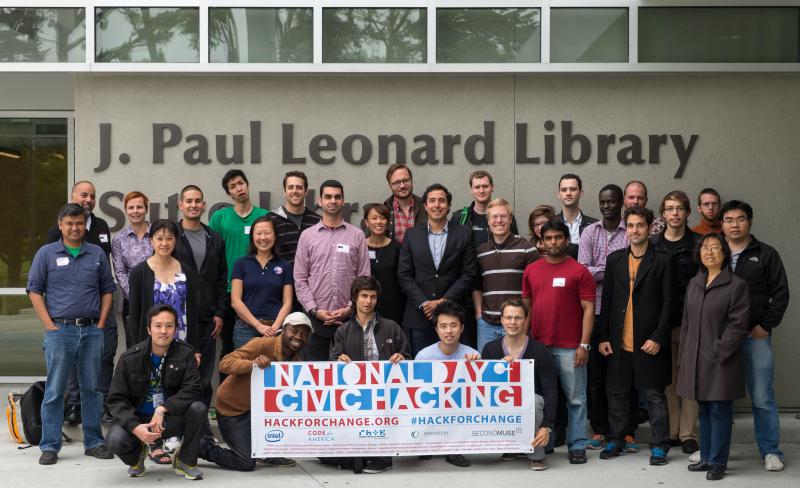
photography by John Tait
Winning Projects
Team Soko was the winning project...more about winning projects
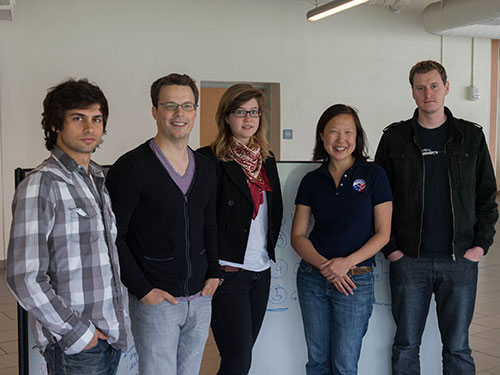
photography by John Tait
Register Now - Space is limited, so register early.
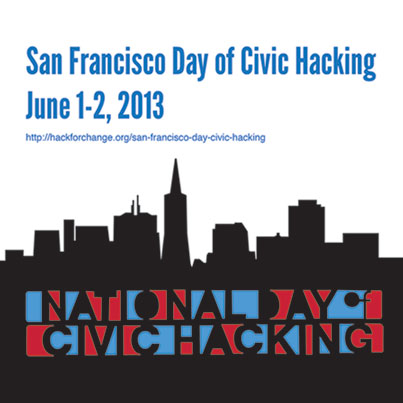
Local Sponsors
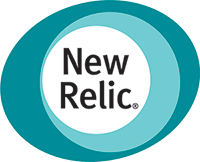
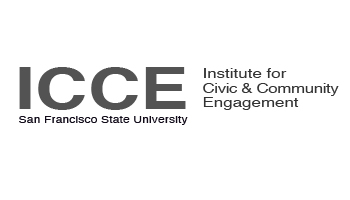
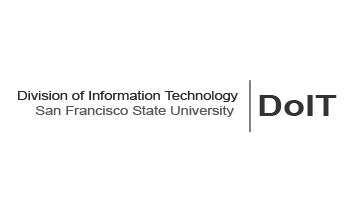
Frequently Asked Questions
At a civic hackathon, people who know and love technology (software developers, designers, entrepreneurs, etc.) come together with people who know and love urban issues (city staff, local organizations, community members and leaders) to use technology and their collective skills to build solutions that matters to our city, and other cities too.
Local communities of "civic hackers" around the world are building powerful open-source applications that help city governments be more open, efficient, and connected to their citizens.
Civic hackers" as we think about it for the National Day of Civic Hacking are engineers, technologists, civil servants, scientists, designers, artists, educators, students, entrepreneurs – anybody - who is willing to collaborate with others to create, build, and invent open source solutions using publicly-released data, code and technology to solve challenges relevant to our neighborhoods, our cities, our states and our country.
Saturday:
9:45 a.m. Check-in and Breakfast
10:00 a.m. Welcome - Schedule and logistics announcements
10:15 a.m. Subject Matter Expert briefing - Challenges/Datasets/API
Presentation by
Lia Bolden, U.S. Census Bureau
Yune Lee, Peace Corps
Kevin Boer, Rhok Foundation
11:00 a.m. Begin coding
12:30 p.m. Lunch
1:00 PM Presentation by Brian Behlendorf, Topic: "Open Data and Open Standards"
1:30 p.m. Coding continued
3:00 p.m Presentation by TBD
4:30 p.m. Optional progress briefing, more coding
5:00 p.m Presentation by TBD
7:00 p.m. End of Day 1
Sunday:
10:00 a.m. Breakfast
10:15 a.m. Logistics briefing & updates
10:30 a.m. Begin coding
12:00 p.m. Submission Deadline
12:00 p.m. Lunch
1:00 p.m. Presentation of projects
2:30 p.m. Judges Voting
3:00 p.m. Awards
3:30 p.m. Post event social
Julio Feliciano, Web Specialist, Division of Information Technology
Phoebe Kwan, Associate Vice President and Chief Technology Officer, Division of Information Technology
Sameer Verma, Professor, Information Systems Department
National Day of Civic Hacking is a national event that will take place June 1-2, 2013, in cities across the nation. The event will bring together citizens, software developers, and entrepreneurs from all over the nation to collaboratively create, build, and invent new solutions using publicly-released data, code and technology to solve challenges relevant to our neighborhoods, our cities, our states and our country. National Day of Civic Hacking will provide citizens an opportunity to do what is most quintessentially American: roll up our sleeves, get involved and work together to improve our society.
Benefits
You should participate in National Day of Civic Hacking because the toughest challenges are not one community’s alone to solve. This is a unique opportunity to get involved, connect with others like yourself, and develop technology that will make the world a better place.
-
Demonstrate a commitment to the principles of transparency, participation, and collaboration.
-
Exercise a government’s interest in using open data and technology, in partnership with others, to address your local community’s felt needs.
-
Liberate open data that can inform better problem solving in every community.
-
Continue to collectively map a national innovation ecosystem and create new access points to that system.
-
Engage citizens in cities with little technology infrastructure to contribute to changing their community through open source, open data, entrepreneurship and code development.
-
Promote Science, Technology, Engineering and Mathematics (STEM) education by encouraging students to utilize open technology for solutions to real challenges.
-
Encourage large scale partnership and mutual understanding.